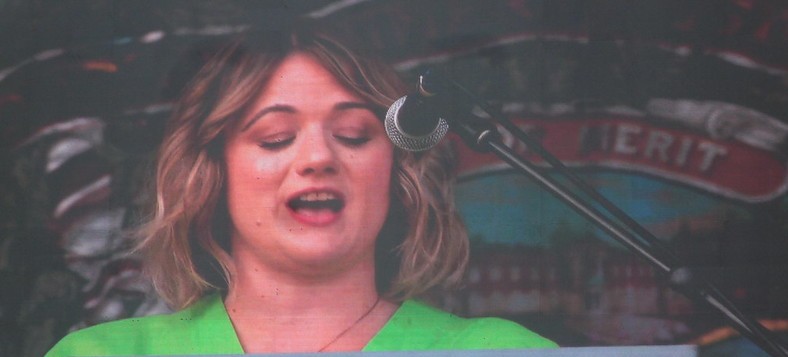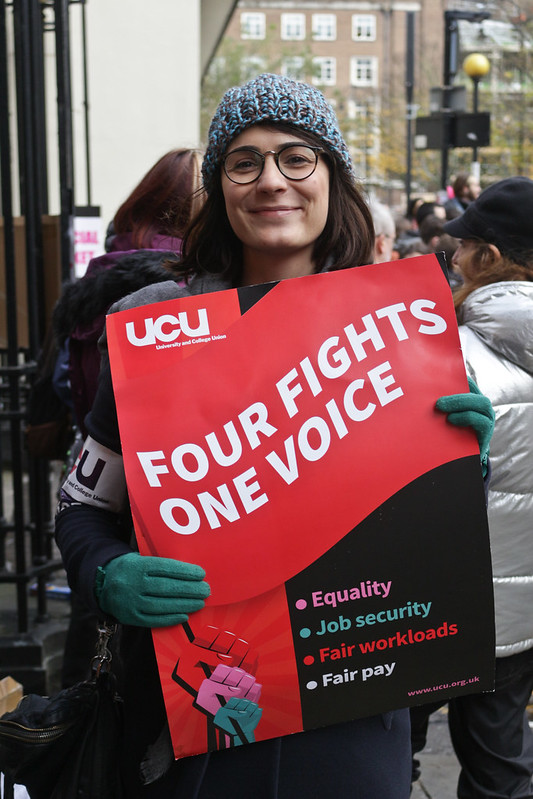In 2019 Jo Grady, a lecturer from Sheffield University, was elected as General Secretary of UCU in an election which saw a relatively high turnout for a union election (20.5%). Grady had been active on social media and in the USS pensions dispute. In this election Jo Grady won 11,515 of first preference votes, Matt Waddup, a candidate who was a UCU full-time official won 6,104 first preference votes and Jo McNeill, the UCU Left candidate won 6,019 first preference votes. In the election, conducted by single transferrable vote, Jo McNeill was eliminated and after her second preference votes were transferred, Jo Grady won by 15,214 votes to 7721 votes for Matt Waddup. It was a clear win and at the time was seen by many in UCU as a move to the left. It is likely that many new activists, mobilised in pre-92 universities by the USS pensions dispute, voted for Jo Grady in this election.
The 2019 UCU General Secretary election came about after the disruption of UCU Congress 2018 following the lodging of votes of censure and no confidence in Sally Hunt, who was UCU General Secretary from 2006 (the formation of UCU), at first jointly with the outgoing NATFHE General Secretary, Paul Mackney, and before that General Secretary of AUT (Association of University Teachers).
The votes of censure and no confidence had been lodged because Sally Hunt had publicly opposed some democratic decisions of the Higher Education Sector Conference. In UCU the Annual Congress decides overall policies but sectoral employment policies for Further and Higher Education are decided respectively by the Further Education Sector Conference and the Higher Education Sector Conference. Sally Hunt’s leadership of the union had also been contentious at times for her use of referenda in what were seen as attempts to bypass or overturn decisions of democratic bodies of the union.
So how did Jo Grady change into Sally Hunt mark 2?

The election of Jo Grady brought about some changes in the internal politics of UCU. Before then there were two organised caucuses within the union: the Independent Broad Left (IBL), comprising the Communist Party, the right of the Labour Party and old-guard AUT elements who were generally disinclined towards industrial action and UCU Left, which is based on the left in the union, including SWP and some members of other left groups, non-aligned lefts, the left of the Labour Party (when it existed) and some supporters of the Green Party. A third group, calling itself UCU Commons, emerged as supporters of Jo Grady. Many of the UCU Commons members were social media activists, but they did not necessarily have much prior experience of elected union office-holding. In the last 5 years the IBL and UCU Commons have become closer, partly because the IBL has little influence on its own.
How did Jo Grady lead UCU when in office? It can be very easy for new general secretaries to under-estimate the difficulties of the tasks they face, especially when it comes to resolving industrial disputes. What has happened in the management of disputes, particularly the Four Fights dispute in Higher Education (over pay, pay equality, workloads and casualisation) has been inconsistency and misuse of e-consultations.
For a union like UCU, delays in timing of ballots and action can be critical, since some sanctions, such as the Marking and Assessment Boycott, have much greater impact at some times of the year than others. The failure to run the re-ballot in HE over the summer, to renew the industrial action ballot, as decided by Annual HE Sector Conference, led to a gap in the ballot mandate and undoubtedly contributed to the loss of the mandate when less than 50% of members voted in the reballot when it was finally held in the autumn term.
The fact that UCU did not succeed in autumn 2023 in renewing its industrial action ballot in Higher Education has encouraged and emboldened some employers to go on the offensive. This includes attacks on jobs at Aberdeen, Oxford Brookes, Northumbria, Kent and Goldsmiths Universities, attacks on jobs and contracts at Sheffield Hallam University, fire and rehire at SOAS and attacks on contracts at Brighton University.
Democracy
The recent General Secretary election in UCU involved major debates about union democracy and industrial strategy. For the left in UCU, union democracy is based on upholding the sovereignty of Annual Congress and Sector Conferences as outlined here. There is a recognition that democratic involvement of the members is essential to winning industrial disputes.

The IBL and UCU Commons groups, united as the Campaign for UCU Democracy, are increasingly defining union democracy in terms of the use of electronic consultations and referenda instead of meetings of members. They write:
‘The Campaign for UCU Democracy (UCUD) wants the union to take democratic decisions that reflect the views of the broad membership, rather than those of a small group of activists who attend meetings.’
The argument that activists are unrepresentative is an old one, much used by Tory politicians and the Labour right. Taken to its logical end it can result in the view that activists should be given less attention and have fewer democratic rights in a trade union than inactive members. There is no consideration of how to increase attendance at union meetings, for instance by negotiating with employers for facility time for all members to attend branch meetings.
These debates about union democracy are taking place in UCU in a context in which, partly because of the Covid Pandemic and the rapid growth of Zoom and other electronic conferencing platforms, unions have transferred many of their meetings to an online or hybrid format and have made increasing use of electronic surveys and consultation exercises.
Now there is nothing wrong with making greater use of online communications to involve members in the work of trade unions, but surveys and e-consultations should be a supplement not a substitute for the existing democratic processes of trade union government. What is important about meetings is that members discuss and listen to argument, including opposing viewpoints, before voting. Snap opinion polls give too much power to whoever words the questions and can isolate and atomise members who may vote without any discussion with work colleagues.
Industrial strategy
Debates about industrial strategy occur in many unions. Often the right-wing, full-time officials and at least parts of the NEC argue that members are not willing to fight or have had enough of industrial action. The left does not claim that members are always eager for action, but it does argue that without industrial action what can be achieved by negotiating skills alone in the collective bargaining process is often minimal. Thus, it argues the case for serious and substantial industrial action as a basis for achieving acceptable agreements.
The outcome of the General Secretary election is that Jo Grady has been re-elected and there will be another five years of these arguments about industrial strategy and union democracy. In this General Secretary election there were four candidates and there will be debate as to whether there would have been a different outcome if there had been only one opposition candidate.
There are two things worth noting about the voting figures. The first is that the turnout had gone down from the 2019 election. In 2019 turnout was 20.5%. In 2024 it was 15.1%. This indicates a lower level of membership engagement in the process. The second is that Jo Grady achieved a majority, but by a smaller margin than in 2019. In the 2024 election, Jo Grady only won after the transfer of second preference votes from Saira Weiner, the UCU Left candidate and Vicky Blake, a non-aligned left candidate. She then defeated the remaining candidate, Ewan McGaughey by a margin of 182 votes, with Jo Grady receiving 7758 votes and Ewan McGaughey 7576 votes.
NEC results
The NEC election results were published a few days after the General Secretary election vote. It is important for the left to contest these seats to ensure that policies voted on by UCU Congress and Sector Conferences are implemented following Congress. Regrettably UCU Left did not win the Vice-Presidency, which has gone to David Hunter, a supporter of Jo Grady.
The NEC election results do not produce any major change in the political balance on the NEC. Saira Weiner, the UCU Left GS candidate, has been elected in the UK-wide Higher Education constituency. Overall, UCU Left won 13 out of the 28 NEC seats up for election. Four seats went to independent left candidates. So, this is an NEC where the left still has a strong presence. UCU Left is still the largest organised group on the UCU NEC and with the non-aligned lefts forms a small majority.
UCU Congress 2024 is in Bournemouth on 29-31 May. It will be an opportunity to debate how UCU responds to the various attacks UCU members are facing in terms of cuts to jobs and educational provision, casualisation, workload pressures and attacks on contracts. The left has important work to do, but it has done reasonably well in the overall NEC elections, despite not winning the General Secretary or Vice-President elections, and if united is in a good position to build the necessary fightback at the UCU grassroots.
Art (53) Book Review (121) Books (114) Capitalism (68) China (80) Climate Emergency (98) Conservative Government (90) Conservative Party (45) COVID-19 (44) EcoSocialism (55) Elections (83) Europe (46) Fascism (57) Film (49) Film Review (68) France (70) Gaza (60) Imperialism (100) Israel (124) Italy (46) Keir Starmer (53) Labour Party (111) Long Read (42) Marxism (49) Marxist Theory (48) Palestine (169) pandemic (78) Protest (152) Russia (340) Solidarity (142) Statement (48) Trade Unionism (141) Ukraine (346) United States of America (132) War (368)


In Scotland’s education system, UCU is the main union for teaching and academic staff only in pre-92 universities, while EIS is the main teaching staff union in all colleges and in the post-92 universities. There is currently a bitter industrial dispute within the 26 colleges over a delayed pay award – both EIS teaching and Unison support staff members have voted for strike action. There was a complete shutdown across the country of all 26 colleges by an EIS and Unison joint strike on 29 February. EIS members are also taking rolling action in three colleges in the constituencies of SNP government ministers over the three weeks before Easter. This culminates in strikes on 25 and 27 March in the Glasgow constituency of First Minister, Humza Yousaf, to call on the Scottish government that funds the colleges to intervene in support the demands of college staff for a decent pay rise. Funding has been cut significantly to Scotland’s colleges by the SNP government, trying to balance the budget books following a real terms cut in the UK government grant.
The strike action that was to have taken place this week by UCU members at Aberdeen University’s languages department was called off at the last minute, when the employer withdrew the threat of compulsory redundancy. The proposed cuts in languages programmes had deep resonance and generated concern across Scotland, due to the impact on Gaelic courses in particular, and on other modern European languages (given the strong desire for continuing cultural and economic links with the EU and EEA states held in Scotland). There was huge public support for the UCU, which the university has had to respond to.